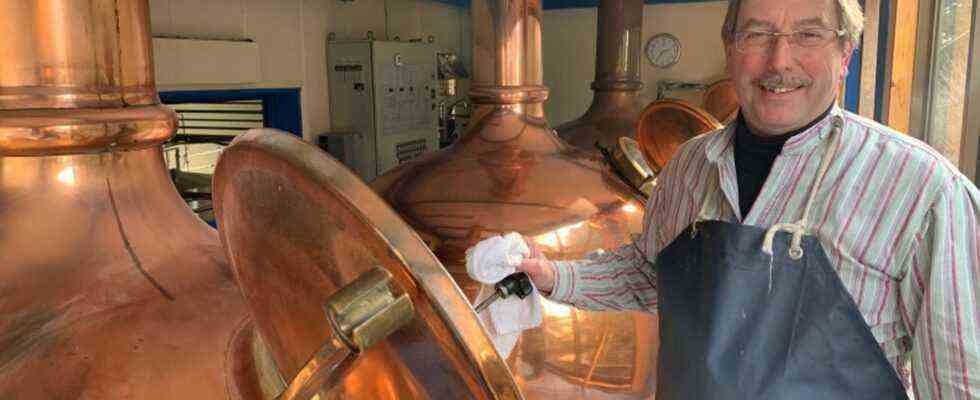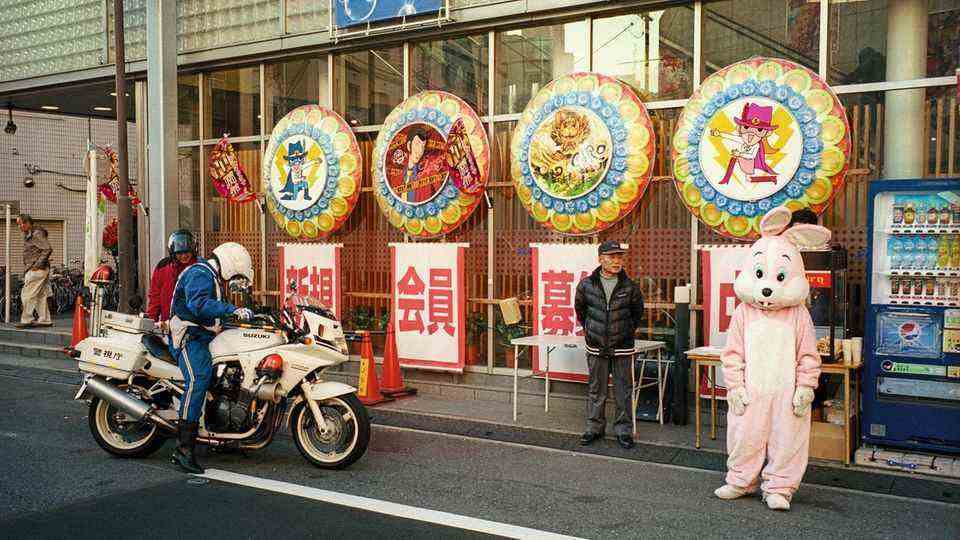“Bavaria Master Beer”
He is the only German brewer in Japan – and particularly proud of the purity law
Since 2004, Stephan Rager has been brewing four types of beer in accordance with the Bavarian Purity Law in his brewery at the foot of Mount Fuji
© Lars Nicolaysen / DPA
Stephan Rager from Tegernsee is the only German brewery owner in Japan. He has been brewing mushroom, wheat and seasonal beer with Mount Fuji water since 2004. He is particularly proud of the Bavarian Purity Law.
Japan’s sacred mountain Fuji peeps out from behind dense clouds while hearty Bavarian folk music blares at its foot. “Yokoso, irasshaimase” (“Welcome, come in”), Stephan Rager, 55, greets his guest in Japanese in front of a photo that shows the Bavarian from Tegernsee with the then Japanese Crown Prince and today’s Emperor Naruhito. Beer tankards and bottles with the “Bayern Meister Bier” label adorn the bar. That’s the name of Rager’s brewery. He is the only German brewery owner in the land of the rising sun. He brews his beer according to the German, or more precisely the Bavarian, purity law. With the water of Mount Fuji. “This is the best water for brewing beer in all of Japan,” enthuses the man from Bad Wiessee with a Bavarian accent.
Beginnings of Japanese beer brewing
It all started in the mid 90’s. In order to stimulate the economy, Japan facilitated the establishment of small breweries at the time. Many systems were sold from the traditional beer stronghold of Germany to the island state. At the same time, German master brewers were in demand to manage the establishment of such guest breweries in Japan, to train the staff and, of course, to brew the beer. “That’s how I came here,” Stephan Rager recalls at the beginning of his adventure in Japan.
In Fujinomiya, the hometown of his wife Yukari at the foot of the Fuji World Heritage Site, the couple leased the former warehouse of a sake manufacturer a few years later and built their own small brewery with a small restaurant attached, entirely on their own. The start was in the summer of 2004.
Brewery according to the Bavarian Purity Law
Since then, Rager has been brewing its “Bayern Meister Bier”, strictly in accordance with the Bavarian Purity Law. “We only use water, hops, malt and yeast, just like most breweries in Germany,” says the Bavarian proudly, looking at his three shiny copper kettles. He imports the ingredients almost exclusively from Germany. From these, the mash, an intermediate stage of the beer made from hops and malt, is pumped into stainless steel tanks and yeast is added. After fermentation, Ragers beer finally flows into the bottles. He has four main types on offer: a Pils called Prinz, his wheat called Edelweiße and two changing seasonal beers.
Rager is a niche player in the land of the rising sun. The beer market is dominated by the four major breweries Kirin, Asahi, Suntory and Sapporo, which together have a market share of over 95 percent. While they almost only produce beer in cans around the clock, “Bayern Meister Bier” only fills bottles once or twice a month due to the corona virus. Although most master brewers from the big Japanese breweries also learned their trade in Germany, they didn’t brew according to the German Purity Law, explains Rager. A few years ago, the definition of beer was even watered down again. Since then, a drink in Japan can still be called beer if the malt content is only 50 percent.
niche product beer
In addition, not only hops are allowed as a spice, but also ingredients such as fish, crab extract or tomato juice. “Everything you can’t imagine is in there,” says Rager, adding with a wink: “Sometimes intense. Everyone has to decide for themselves whether it tastes good.”
One cannot speak of a real beer culture in Japan anyway. “It is generally believed that the Japanese are big beer drinkers. But that clearly has to be revised,” says the Bavarian. Oktoberfest is popular in Japan. So much so that they can be found all over the archipelago from spring to autumn. But while in Germany around 99 liters of beer are drunk per capita every year, in Japan it is just around 39 liters. “These are worlds,” says Rager.
Beer consumption in Japan is falling due to demographic change
The rapid aging of Japanese society and the ongoing decline in population due to a lack of immigration have contributed to the fact that beer consumption in Japan has been falling for years. “Young people don’t drink as much beer anymore,” says Rager. They prefer alcoholic mixed drinks, which are cheaper than heavily taxed beer. There has also been a cheap beer alternative called Happoshu, “bubbling alcohol,” for decades. In any case, beer is often only drunk as a starter drink in Japanese pubs, says master brewer Rager. After that, Japanese would quickly switch to stronger alcohols like sake or whiskey mix drinks.
But that doesn’t bother Rager. The man from Lake Tegernsee proudly says that his wheat beer is very well received by his customers, who appreciate the Bavarian Purity Law. His Pils also goes “well with Japanese fish – not too bitter and not too sweet”. Rager and Ms. Yukari, who offers German home cooking such as spaetzle, roast pork and sausages in the restaurant in front of the brewery, have both Japanese and German customers among their customers. “Bayern Meister Bier” is the preferred supplier of the embassy in Tokyo.
On the occasion of 160 years of German-Japanese friendship, Rager brewed a beer with matcha and green tea last year. “The only compromise beer that isn’t brewed according to the Purity Law,” admits the Bavarian with a hearty laugh. “But that’s a great beer.”



